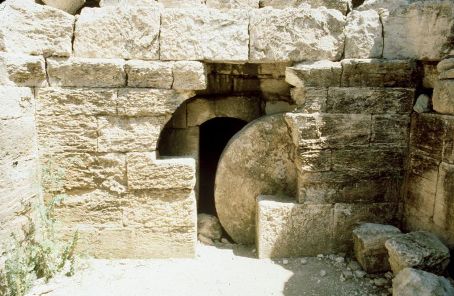|
Proving the Existence of JesusThe Tomb How do we know that Jesus was actually placed in a tomb and not thrown into a grave? How do we know that Jesus’ body was missing? Is it possible someone stole it? Were there witnesses? Strobel also interviewd William Lane Craig, PH.D., D.TH. Craig has a master of arts degree from Trinity Evangelical Divinity School and a doctorate in philosophy from the University of Birmingham, England. Craig wrote eight books including Reasonable Faith and No Easy Answers.
Firstly, Craig states that Joseph of Arimathea, a member of the very council – the Sanhedrin – that voted to condemn Jesus. He took Jesus’ body and placed him in the tomb, according to the Bible. He says that it is highly improbable that Christians would make this up because of their anger and bitterness towards Jewish leaders. They wouldn’t make up a specific person from a specific group, whom people could check out for themselves to see if it was true. So Joseph was a real historic figure. Craig goes on give the top points to prove the empty tomb was a fact: 1. 1 Corinthians 15 – a very old and reliable source of history information about Jesus 2. The tomb was known to both Christians and Jews in the city. So although Christians could have faked it, the Jews in the city would not because they didn’t believe Jesus was God. 3. Mark’s passionate language, grammar, and style of writing seem genuine. Also, there’s evidence it was written before A.D. 37, which is too early for people to have corrupted it. 4. The unanimous testimony that the empty tomb was discovered by women argues for the authenticity of the story. In those days women had very little rights and were not well respected. If the disciples were to lie about it, they certainly would not have said women found the tomb empty, because it would have been embarrassing. 5. The earliest Jewish doctrine assumes that the tomb was empty. In conclusion, Jesus’ tomb was definitely empty. Not only that, but Jesus was seen by over 500 people on that day according to 1 Corinthians 15:5-8. These could not have been hallucinations as we discussed earlier under psychological evidence. Jesus’ resurrection is the single most important event in Christianity because he said he would conquer death and he did. If he said that, then that gives credibility to everything else he taught and clamed, including that he was in fact the living God. References Strobel, Lee. The Case for Christ. Michigan: Zondervan Publishing House, 1998. Print. Page 5 of 5 |





